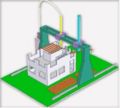Difference between revisions of "Virtual designs into physical objects/Automated construction"
From AdCiv
| Line 1: | Line 1: | ||
| − | Computer controlled flexible manufacturing methods can even be applied to constructing buildings. ''Contour Crafting'' is a technique that has been developed by Behrokh Khoshnevis of the University of Southern California that involves building up the structure of the building in horizontal layers by squeezing out quick drying cement from a shaped nozzle. By the time first layer has been drawn out, the first part to be laid will have solidified enough to take the second layer. This is much like the [http://en.wikipedia.org/wiki/Fused_deposition_modeling 'fused deposition modelling'] 3D printing method but on a huge scale. | + | [[Image:Contour crafting.jpg|right|120px]] Computer controlled flexible manufacturing methods can even be applied to constructing buildings. ''Contour Crafting'' is a technique that has been developed by Behrokh Khoshnevis of the University of Southern California that involves building up the structure of the building in horizontal layers by squeezing out quick drying cement from a shaped nozzle. By the time first layer has been drawn out, the first part to be laid will have solidified enough to take the second layer. This is much like the [http://en.wikipedia.org/wiki/Fused_deposition_modeling 'fused deposition modelling'] 3D printing method but on a huge scale. |
Walls of building constructed using these methods do not have to be straight so complex organic curved and domed buildings could easily be made, mimicking biological structures. | Walls of building constructed using these methods do not have to be straight so complex organic curved and domed buildings could easily be made, mimicking biological structures. | ||
Revision as of 01:43, 26 January 2007
Computer controlled flexible manufacturing methods can even be applied to constructing buildings. Contour Crafting is a technique that has been developed by Behrokh Khoshnevis of the University of Southern California that involves building up the structure of the building in horizontal layers by squeezing out quick drying cement from a shaped nozzle. By the time first layer has been drawn out, the first part to be laid will have solidified enough to take the second layer. This is much like the 'fused deposition modelling' 3D printing method but on a huge scale.Walls of building constructed using these methods do not have to be straight so complex organic curved and domed buildings could easily be made, mimicking biological structures.
Houses can be designed completely on computer, then the automated constructor sets to work with no human labour involved. Pipework and cabling could even be laid inside walls as they are being built. The team developing this technology in California reckon that the structure of a two-storey house could be built within 24 hours. So it seems that this type of construction has the potential to be far faster, cheaper, safer and more flexible than conventional construction using bricks. No house need ever be the same again...
